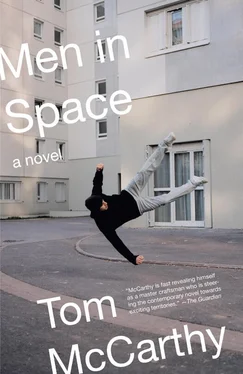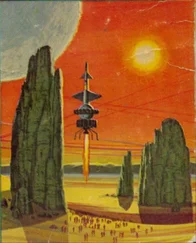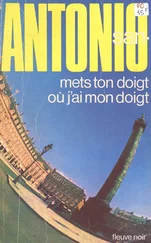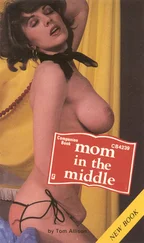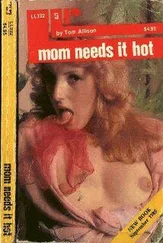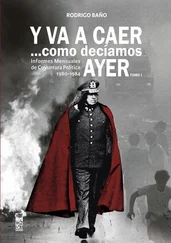The concierge was a real cunt. These old Czechs all speak German — she probably got plenty of practice during the war, denouncing her Jewish neighbours — so I explained to her in German that I was a friend of Maňásek, and she just said: “ Er ist tot. ” I swear I saw a glint in her eyes as she said this. She told me as I started up the stairs that Maňásek’s mother and brother were there. When she said this — grunted it , Muuutter, Brüüüder — I thought twice about continuing, but did anyway as I’d insisted that she let me in. I found them in his atelier, packing his belongings into boxes. I started to explain who I was, but the mother immediately started ordering me around, told me to lift this and sort through these and so on. I suppose she must have been in shock, denial, whatever you call it these days. She made me and her other son carry all these boxes down the stairs. The other son’s very odd: looks like an idiotic version of his brother. Grinned the whole time, like a stupid schoolboy. I told him who I was but he just grinned more — clearly didn’t understand German. I’m not sure that he understood anything at all, let alone this situation. Out of his depth completely .
It gets stranger: while we were moving boxes out of the flat onto the top landing, a screaming came from downstairs — a woman’s voice at first, then two women’s voices. It sounded as though Maňásek had professional mourners, like in ancient Greece or Egypt. The first wailer was a hysterical girl of thirty-odd, and her wailing was directed at the concierge. Not just her wailing, at that: she’d thrown a bucket of hot water at the old bat — whence the second set of wails. The hysterical young girl was shouting over and over again the word Bulharský! — for some reason. Maňásek’s neighbours had come out and were trying to calm her down. Ivan’s mother gazed on, looking perplexed .
The old concierge, still wailing, slunk into her lair and must have phoned the police, as two of these turned up just minutes later, in plain clothes. Completely unmoved by the sopping witch’s plight, they seemed very keen to talk with the hysterical girl, who’d been taken into a kindly neighbour’s flat and was being fed cups of Čaj. A set of negotiations followed as to whether she could be persuaded to come out and accompany them to the station. Eventually she emerged, and allowed herself to be driven off. No sooner had she and her escorts gone, though, than another pair of policemen turned up, this time wearing uniform. They’d been sent, it turned out, to seal Maňásek’s flat. They did at least allow us to remove the last of the boxes before doing this .
People in Prague are obsessed with flats. It’s worse than back in Amsterdam. They’ll bribe, screw, even marry to procure a good one. Ivan Maňásek’s death, it occurred to me as we left the building, announced itself to the world in the form of an empty, sealed-off flat .
They’d hired a truck. As we all stood beside it and I tried to prevent my gaze from wandering back to the dents around the flowers against the wall, Maňásek’s mother finally asked me how I knew her son. She looked up just before she asked me, and her eyes widened and then seemed to suddenly contract, as though the reality of Maňásek’s fall were just at that moment hitting home — and then she lowered her head once more and asked me what my connection to her son was. Had been. I told her all about the Eastern European exhibition, how I’d planned to include some of his work in it and so on and her eyes widened again, and she said that she’d like the show to go ahead. Not that I’d proposed to cancel it, mind you, although I wasn’t about to correct her on this point — but anyway she said she’d like the show to go ahead, and would I come to her place the next day to select the works of Maňásek that I intended to exhibit? So I said: Natürlich.
Well then, the long and the short of it, my dear Han, is that you shall shortly be receiving a crate with ten paintings by Ivan Patrik Maňásek, 1958–92, enclosed inside. I’ve addressed it to Windtunnelkade because I know that Piet’s away for one week and the Stedelijk Bureau will be unstaffed. You can just tuck the crate into a corner of your workshop, to keep the boys’ grubby hands off it. And you’d treat it with some reverence if you knew what I’d been through to acquire the works! When I turned up at her place the next day, the woman wouldn’t let me leave! She stuffed all this inedible Russian food down my gullet. The brother wasn’t there — but thankfully Maňásek’s flatmate was, a young English boy named Nicholas Boardaman. I’d actually seen him before, although not with his clothes on: he’d been (I should tell you before you get all suspicious) the model in a life-drawing class Martin and I had passed by on our visit to AVU. Small town — small continent, in fact: he’s moving in a couple of weeks to Amsterdam, where he’ll start working for Art in Europe , the journal edited by that thick English woman Julia Emerson. Didn’t she once welsh on paying you for a poster? At any rate, I gave him my number and told him to call when he gets here — there — to Amsterdam .
I must have turned up half an hour or so before him, though. She made me eat all these open sandwiches with various types of chemical paste on them, and drink some kind of home-made vodka that makes the genever you keep knocking back taste good by comparison. She watched me, smiling, while I ate; she was unnaturally calm. I asked her where the paintings were; but she kept saying “Later, later” and pouring me more of her Siberian antifreeze. Now I see where Maňásek got that side of his constitution from. When I finally made it into the room where his paintings were stored, she followed me in and scrutinized my every move. Not suspiciously, mind you — just really intently . It was impossible to concentrate .
Fortunately, the doorbell rang: this was Nicholas, who’d arrived to reclaim his possessions that had been cleared out of Maňásek’s atelier with everything else. He’d been staying at a friend’s when the accident happened, apparently, and hadn’t returned until late on the second. I came out to the kitchen and introduced myself, then slipped quietly back while Mother Russia went to work on him. I think she made him fix a pipe or something: a constant hammering was wafting from there for a good five minutes — after which she came through and scrutinized the selection I’d made, talking me through each one. She’s absolutely ignorant about art (I learnt later that she’d taught Russian to schoolchildren before the Velvet Revolution made her job redundant), and said things like “People will like this one: it’s got a lot of colour in it”. This went on for perhaps another half-hour. She kept popping out to stir the meal that she was cooking for us (the chemical paste was just an hors d’oeuvre), then clumping back to offer me further painterly insights .
The meal was too much. Not only did the food have dog hairs in it (Mother Russia had a mongrel that whelped around the floor), but whatever tranquillizers she was on were — coupled with huge amounts of her home-made Sputnik rocket fuel — sending her poor mind in all kinds of directions. It took Nicholas and me an hour to break loose. We shared a taxi, as it turned out that Nicholas was staying with a friend of his who lives just round the corner from Martin. I helped him carry his case up to his friend’s flat: a beautiful young student named Gábina. Her father runs Prague’s main photography gallery. The three of us went and had a drink together. Nicholas is pretty well informed about the Eastern European art scene. If Bos Kleinhuis turns out to be still sulking at me and Piet, I think I’ll ask Nicholas to write the catalogue for the forthcoming show. We went to a new bar just between Martin’s and Gábina’s flat. The bar was completely white: the walls, the chairs, even the piano that stood in the middle of the floor. As though we’d gone to heaven — which, of course , we hadn’t: Maňásek had. He’d gone somewhere, at any rate. Goodness knows where. Out, apparently .
Читать дальше
